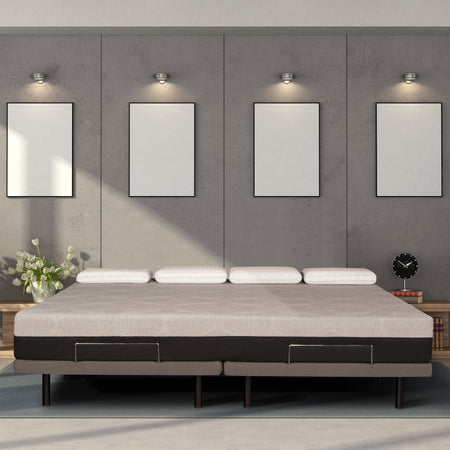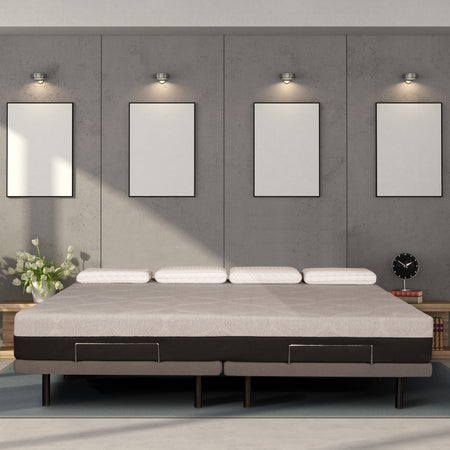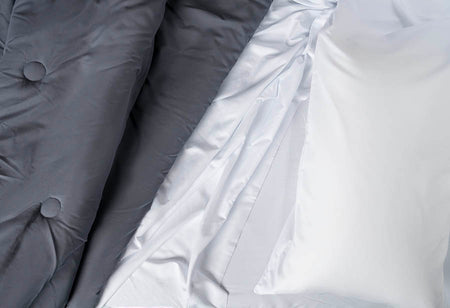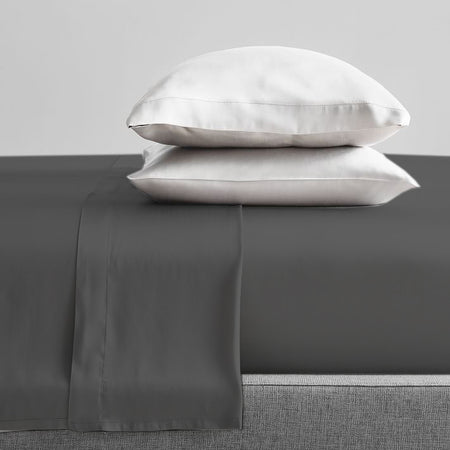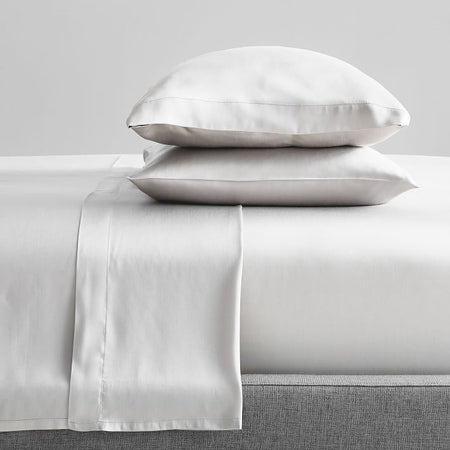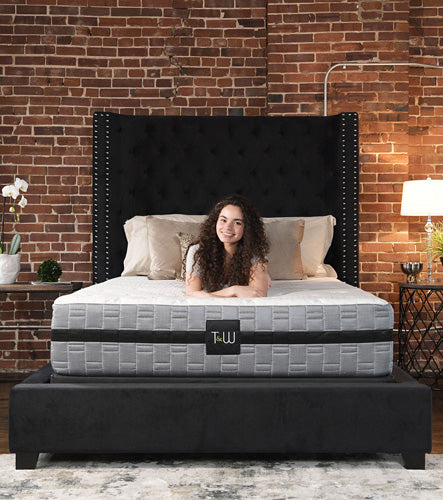You’ve probably heard about REM sleep – the stage where you dream and process the day’s events. But what exactly is REM sleep, and why is it crucial for your overall well-being? And what role does your mattress play in all these? We’ll cover all these in this article to help you get the most out of your nighttime slumber.
What is REM Sleep?
When you fall asleep, it might feel like your body goes into a low-power mode. In reality, your brain is quite active, working through various processes. Sleep is structured, moving through different stages, each with its purpose.
You experience four sleep stages each night. The first three stages are known as non-rapid eye movement (NREM) sleep, followed by the fourth stage, rapid eye movement (REM) sleep. Let’s break this down:
- Stage 1 (NREM): This is the lightest stage of sleep, where you transition from being awake to asleep. It lasts just a few minutes, and during this time, your muscles relax, and your heartbeat slows. You might even drift in and out of consciousness.
- Stage 2 (NREM): Next, you enter a deeper sleep. Your heart rate continues to drop, and your body temperature lowers. This stage usually lasts about 20 minutes and accounts for a huge part of your sleep. You become less aware of your surroundings, and your body prepares for the deeper stages.
- Stage 3 (NREM): Now you reach deep sleep, where your body focuses on healing and repairing itself. This stage is crucial for physical recovery, allowing your muscles to recover and your immune system to strengthen. You’re less responsive to external stimuli, making it harder to wake you up. The brain waves follow a distinct pattern, which is why it is also called slow-wave sleep.
- Stage 4 (REM): After cycling through NREM sleep stages, you enter REM sleep. This typically occurs about 90 minutes after you first fall asleep. Here, your brain becomes highly active, similar to when awake. Your heart rate and breathing can become irregular, and this is when most of your vivid dreaming occurs. REM sleep is critical for processing emotions, consolidating memories, and boosting creativity.

As the night progresses, you cycle through these stages several times. Each complete cycle lasts about 90 to 120 minutes; with each cycle, the amount of time spent in REM sleep increases. So, the second half of the night is when you’ll likely get the most REM sleep, which is vital for your overall well-being.
Why is REM Sleep Important?
During REM sleep, your brain processes and organizes all the information you've gathered throughout the day. It’s like your mind is filing away memories, making sense of emotions, and even problem-solving. This stage plays a huge role in your emotional health—getting enough REM sleep helps you handle stress and keep a positive mood. Without it, you might feel more irritable, anxious, or even struggle with your memory and focus the next day.
Rapid Eye Movement sleep is also linked to creativity and learning. Ever notice how sometimes a good night’s sleep helps you solve a problem or come up with new ideas? That’s your brain working behind the scenes during REM sleep, connecting the dots in ways it couldn’t while you were awake.
The more REM sleep you get, the more your brain can perform these crucial tasks. That’s why ensuring your sleep cycles flow smoothly and that your mattress supports uninterrupted rest is essential. In this article, we’ll examine how your mattress affects your REM sleep and overall sleep quality so you can get the rest your brain and body need.

What Role Does Your Mattress Play in REM Sleep?
Like most people, you likely focus on how many hours of sleep you get. But the quality of your sleep, especially during REM sleep, really matters. And your mattress plays a huge role in this.
How Mattress Quality Impacts Your Sleep
When it comes to getting a good night’s sleep, the quality of your mattress can’t be overlooked. If your mattress doesn’t provide the right support, you might wake up more than you realize during the night.
Every time you shift, especially if you're uncomfortable, you interrupt the natural flow of your sleep stages—especially the important REM stage. And REM sleep is crucial for things like memory, mental health, brain development, and managing stress. Without enough of it, you might notice you're feeling more tired or irritable throughout the day.
Finding the Right Balance
The firmness of your mattress plays a big part in how well you sleep. If it’s too firm, it can cause pressure points, but if it’s too soft, it might not give you enough support. Both can lead to discomfort and disrupt your sleep cycle. Worse, this could trigger issues like sleep apnea, raising your blood pressure and making it harder to get quality sleep.
A hybrid mattress could be a great solution. It blends the supportive feel of springs with the softness of foam or latex, helping distribute your weight evenly and reducing pressure on your body. This means you’ll move around less and get deeper, uninterrupted sleep—which means more REM.

Choosing the Right Mattress for Better REM Sleep
If you want better REM sleep, here’s what you should look for in a mattress:
- Support: You need a mattress that supports your spine naturally. This keeps your body in alignment and reduces the chances of waking up during the night, helping your brain cycle smoothly into REM sleep.
- Firmness: The right firmness depends on your sleep position. Back and stomach sleepers often need something firmer, while side sleepers usually do better with a softer mattress to cushion their shoulders and hips.
- Temperature Control: If you’re waking up because you’re too hot or cold, it might be time for a mattress that regulates temperature better. Keeping your body temperature steady helps support your circadian rhythm, which is key for getting enough hours of sleep, especially REM.
- Motion Isolation: If you sleep with a partner, you’ll want a mattress that reduces motion transfer. This way, their movements won’t disturb you, and you can stay in deep, restorative sleep longer.
The quality of your mattress affects how well you sleep—especially during REM. When your mattress supports your body correctly, keeps you comfortable, and suits your sleep style, you’ll likely get the deep, restful sleep your body and mind need. So, if you’re having a hard time falling asleep or are waking up tired, it might be time to rethink your mattress. A good one can make all the difference in how you feel each day, mentally and physically.


